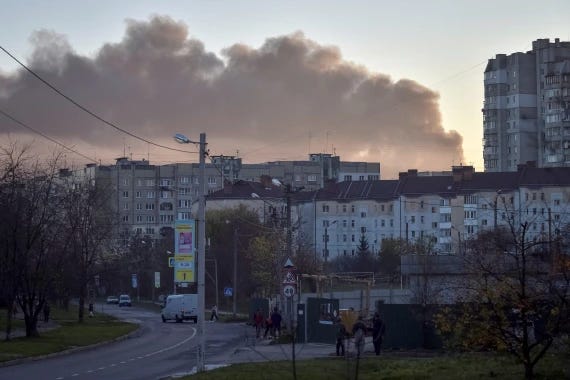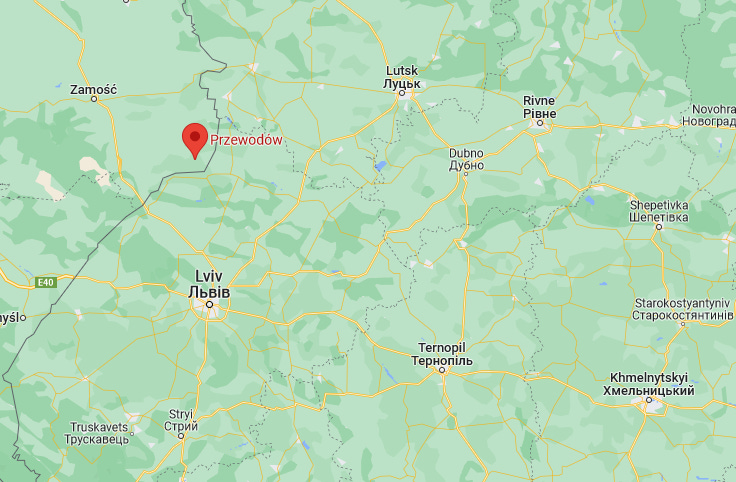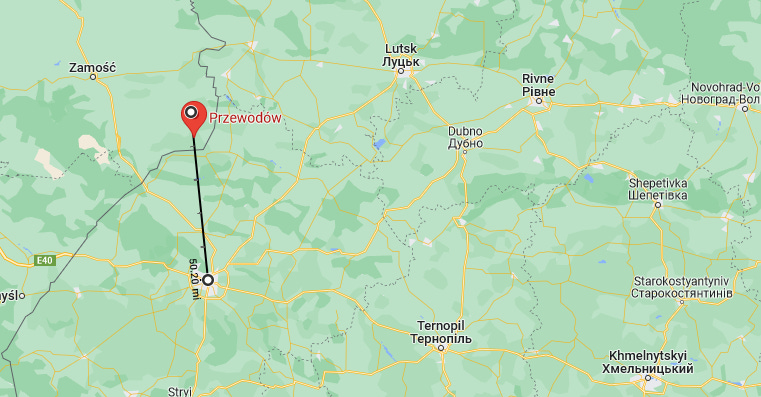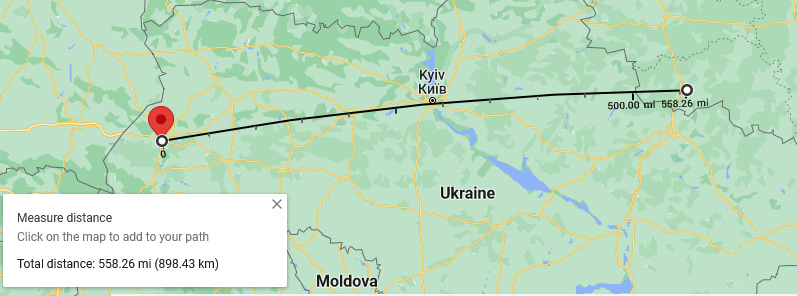Russian Missiles Striking Poland?
Regardless Of What Ultimately Happened, This Is A Major Escalation
At approximately 7PM (1900) Greenwich Mean Time on November 15, 2022, Arab media outlet Al-Jazeera posted a news blurb to their live news feed on the Russo-Ukrainian War outlining an apparent missile strike in Poland just across the border from Ukraine.
Explosion kills two in Poland near Ukraine border
Two people have been killed in an explosion in Przewodow, a village in eastern Poland near the border with Ukraine, firefighters have said.
“Firefighters are on the spot, it’s not clear what has happened,” said Lukasz Kucy, an officer on duty at a nearby firefighters’ post.
Polish Radio ZET reported earlier that two stray missiles hit Przewodow killing two people, without giving any more details.
The reports came as Russia was pounding cities across Ukraine with missiles in what Kyiv said were the heaviest wave of missile attacks in nearly nine months of war.
Polish Prime Minister Mateusz Morawiecki has called an urgent meeting of a government committee for national security and defence affairs, the government spokesman said on Twitter.
I hope it is obvious that, even as I write this article, this story is continuing to unfold. There is already commentary from all sides regarding this event and its tragic loss of life, all of it informed to varying degree by both facts and politics.
However, given the potential for outsized ramifications and consequences from this event, this is one story where the facts matter more than ever. As I write this, I urge everyone to be mindful that, in any unfolding story, facts emerge when and how they will, and thus what seems true in one moment may be disproven in the next. In following this story especially, the constant guideline should be to always follow the facts, and ignore the politics.
The Explosions In Poland Come Amid A Large Russian Missile Barrage
An important context for the apparent missile strikes in Poland is that they come on the heels of several hours of reporting on a large scale Russian missile barrage targeting civilian infrastructures—chiefly energy installations—across Ukraine.
Russia pounded Ukraine’s energy facilities Tuesday with its biggest barrage of missiles yet, striking targets from east to west and causing widespread blackouts. A defiant President Volodymr Zelenskyy shook his fist and declared: “We will survive everything.”
Neighboring Moldova was also affected. It reported massive power outages after the strikes knocked out a key power line that supplies the small nation, an official said.
Zelenskyy said Russia fired at least 85 missiles, “most of them at our energy infrastructure,” and shut down power in many cities.
To give a sense of the timeline, the earliest Al-Jazeera news posting on the missile attacks was made at 13:28 GMT, and referenced a tweet from Andriy Yermak, Ukraine’s chief of presidential staff.
Based on the reporting timeline, it may be fairly said at this time that the missile barrage occurred over a period of several hours, and several cities in Ukraine, including many not near the front lines around either Kharkiv or Kherson were targeted by Russian missiles.
Based on that same timeline, it appears that the explosions in Poland occurred during that missile barrage, and as the reporting is that they are the result of missile strikes, the immediate conclusion to be reached is that the missile strikes in Poland were a part of this larger barrage of Ukrainian cities.
However, as even Poland acknowledges, that conclusion is still at least somewhat speculative, as the latest Al Jazeera Live Update posting quotes Poland’s President stating that there is at this time no concrete evidence who fired the missiles.
No concrete evidence on who fired missile: Duda
Poland’s president has told reporters there is no concrete evidence – as yet – indicating who fired the missile.
“We do not have any conclusive evidence at the moment as to who launched this missile… it was most likely a Russian-made missile, but this is all still under investigation at the moment,” Duda said.
This posting appeared on the live news feed since I began writing, to illustrate how much in flux the facts on the ground are at this time.
Was It An Accident?
Przewodów, Poland, lies just 15 miles from Poland’s border with Ukraine.
More importantly, Przewodów is approximately 50 miles from the Ukrainian city of Lviv, which is one of the cities that has been a major recipient of Russian missiles during this barrage.
More than a dozen regions reported strikes, among them Lviv in the west, Kharkiv in the northeast and many others in between.
Lviv, being in far western Ukraine, is over five hundred miles from the Russian city of Belgorod.
This is not to suggest that missiles were fired from Belgorod. At the time of this writing the orgin(s) of the missiles has not been reported.
The purpose of noting this distance is to underscore the range involved of these missile attacks, and that a targeting error of roughly fifty miles is less dramatic than it might first appear. It is also a possibility that Ukrainian air defense damaged and/or deflected the missiles, causing them to stray beyond Ukraine’s borders into Poland.
Al Jazeera’s Jonah Hull, reporting from Kyiv, said it was possible the missiles had “missed their targets, overshot their targets, or were pushed off course by Ukrainian air defences”.
“But I think we need to be very, very careful about speculating along those lines until the details of the attack become clearer,” Hull said.
To illustrate how little deflection might be involved, Przewodów, Poland is approximately the same distance from the Russian city of Belgorod as Lviv.
A deflection of a missile over eastern Ukraine could easily result in the missile landing in Przewodów.
Thus, if these missiles were a part of Russia’s larger barrage, it takes no great leap of faith or stretch of the imagination to see how these missile strikes were accidental and not deliberate. This is particularly important, as a Russian missile accident in Poland is easily understood not to be a Russian missile attack against Poland. Accordingly, it is not an automatic at this time that NATO’s collective defense clause known as Article 5 should be invoked.
The Parties agree that an armed attack against one or more of them in Europe or North America shall be considered an attack against them all and consequently they agree that, if such an armed attack occurs, each of them, in exercise of the right of individual or collective self-defence recognised by Article 51 of the Charter of the United Nations, will assist the Party or Parties so attacked by taking forthwith, individually and in concert with the other Parties, such action as it deems necessary, including the use of armed force, to restore and maintain the security of the North Atlantic area.
At this time, it cannot be said with any degree of certainty that Poland was attacked, and so Article 5 should not be presumed to be on the table in any capacity. This may change as further facts emerge, but at this time the world is not facing the prospect of a direct NATO reprisal against Russia.
An Accidental Strike Does Not Exonerate Russia
While we are far from identifying this missile strike as an attack against Poland, that does not mean we are far from excoriating and condemning Russia for the related missile barrage broadly.
The blunt and inescapable truth of Russia’s selection of civilian infrastructure as missile targets is that it is a violation of the Geneva conventions—specifically Article 54 of the Additional Protocol I to the Geneva Conventions of 12 August 1949, as of 8 June 1977.
2. It is prohibited to attack, destroy, remove or render useless objects indispensable to the survival of the civilian population, such as foodstuffs, agricultural areas for the production of foodstuffs, crops, livestock, drinking water installations and supplies and irrigation works, for the specific purpose of denying them for their sustenance value to the civilian population or to the adverse Party, whatever the motive, whether in order to starve out civilians, to cause them to
move away, or for any other motive.
While Article 54 focuses primarily on food, agricultural production, and water supplies, especially with winter fast approaching it is hardly a stretch of the language to recognize that energy infrastructure qualifies as “objects indispensable to the survival of the civilian population”.
Russia’s missile barrage, therefore, even without the strikes in Poland, is arguably a war crime all by itself—one of many such crimes, as this is not the first missile barrage exclusively targeting civilian infrastructure.
Nor is the war crime language an exaggeration. Article 8 of the Rome Statute of the International Criminal Court includes the following acts in its statutory definition of the term “war crime”:
Other serious violations of the laws and customs applicable in international armed conflict, within the established framework of international law, namely, any of the following acts:
Intentionally directing attacks against the civilian population as such or against individual civilians not taking direct part in hostilities;
Intentionally directing attacks against civilian objects, that is, objects which are not military objectives;
Intentionally launching an attack in the knowledge that such attack will cause incidental loss of life or injury to civilians or damage to civilian objects or widespread, long-term and severe damage to the natural environment which would be clearly excessive in relation to the concrete and direct overall military advantage anticipated;
Attacking or bombarding, by whatever means, towns, villages, dwellings or buildings which are undefended and which are not military objectives;
Missile attacks which target Ukraine’s civilian infrastructure arguably fall within the scope of “war crimes” per the ICC’s Rome Statute’s definition1.
While Ukraine is also likely guilty of acts which constitute war crimes, as the UN has already explicitly acknowledged, as of this writing Ukraine has not conducted large-scale indiscriminate attacks against Russia’s civilian populations and infrastructures. Even the attack on the Kerch Bridge, while asymmetric in nature, still can be argued as an attack upon a legitimate military target, as Russia uses the bridge to resupply its forces in southern Ukraine.
If it should pan out that the missiles which struck Poland are indeed of Russian manufacture and were launched either in Russia or by Russian armed forces elsewhere, the two deaths suffered by Poles as a result of the missile attack are an aggravating circumstance of what is already an “illegal” act by Russia which is expressly proscribed by the Geneva Conventions (which the Russian Federation has ratified2).
However, to underscore the murkiness of the facts thus far, we should also take note that President Biden is quoted in Al Jazeera as stating that some information may indicate the missile strike did not originate in Russia proper.
Asked about claims that it was linked to Russia, Biden said: “There is preliminary information that contests that. I don’t want to say that until we completely investigate it but it is unlikely in the lines of the trajectory that it was fired from Russia but we’ll see.”
Additionally, there is also information emerging indicating that the missiles were Russian made air defense missiles fired by Ukraine against Russia’s incoming missile barrage.
While this would mean that Russia itself did not fire the missiles, Russia did initiate the broad missile barrage against which Ukraine possibly fired these missiles in self-defense. Potential Ukrainian culpability for the specific missiles which struck Poland does not erase Russian culpability for the mass targeting of civilian infrastructure within Ukraine. Ukraine at least has the mitigating claim of self-defense. Russia cannot make such a claim regarding the missile barrage.
By Any Measure, An Escalation
It is impossible not to view the missile strikes in Poland and resulting in the loss of Polish life as an escalation of the war in and over Ukraine.
We must remember that Putin himself, in his televised address to both announce and justify the war, described it as a “special military operation” with specific goals and objectives.
"Its goal is to protect people who have been subjected to bullying and genocide... for the last eight years. And for this we will strive for the demilitarisation and denazification of Ukraine.
"And to bring to court those who committed numerous bloody crimes against civilians, including against citizens of the Russian Federation."
Without commenting on the legitimacy of these aims, or whether they constitute a valid casus belli for Russia to attack Ukraine, attacks on cities in far western Ukraine, far removed from the Donbass and Crimea, do not fall within even the broadest definition of Putin’s original scope and objectives for the war.
Moreover, even if the missile strike in Poland was an accident arising from Russia’s extensive missile barrage, Russia’s continued large-scale attacks on civilian targets in far western Ukraine made such an accident almost inevitable—fire off enough missiles and a few of them are going to land where they should not. Russia’s continued indiscriminate targeting of civilian infrastructures in this way is easily argued as a demonstration of Russian indifference to such accidents and their clear potential to inflict casualties among innocent civilian populations. Both the particular language of the Geneva Conventions and the Rome Statute and the general tenor of those international treaties decry such behavior in the prosecution of any war.
If it should pan out that the missiles were fired as part of Ukraine’s air defense efforts against Russia’s missile attacks on civilian infrastructures, whether the missiles were fired either desperately or simply recklessly, we are still left with the reality of increasing attacks by Russia leading to increasing defensive responses by Ukraine leading to increasing loss of civilian lives.
In every scenario, this loss of Polish lives marks yet another increase in the scale of violence in the war in Ukraine. As such, it marks yet another increase in the immediate need for that violence to stop and for diplomatic solutions to be found. Whatever the grievances on both sides, there are better ways to redress them than wanton and indiscriminate killing.
We should note that the US and NATO have in the past been guilty of similar conduct which also arguably amounted to war crimes, particularly in the bombing campaigns over Serbia and Kosovo in the late 1990s. However, NATO’s arguable guilt in this regard can have no bearing on the appraisal of Russia’s conduct in Ukraine. The hoary cliche of “two wrongs do not make a right” alone disqualifies any such line of argumentation. The execrable acts of others are never a justification for anyone’s particular execrable acts.
Additional Protocol I to the Geneva Conventions was signed by the USSR on 12 December 1977, and was re-ratified on 29 September 1989.











A very thoughtful post that focused on the facts, including some thinking regarding which facts are more important. This article serves as an example of how journalism should be.
Wow, thank you for the most comprehensive and intelligent article on this situation to date!
BRAVO!
You would think that "talks" would have begun between nations neighboring Ukraine and Russia at the onset of the military operation regarding potential collateral damage. Perhaps they did?
I have already seen articles blaming Ukraine S-300 air defense missiles, and reminding everyone of the Ukrainian downing of MH17, which was comprehensively proved to be due to Russian action.
I thought it was 2 missiles, which would seem even less likely that both could have missed the same amount. At least they have been initially identified as S-300 instead of Buks.
Peter, this is all messed up, and we can not be sure why, but thank you for superb reporting!